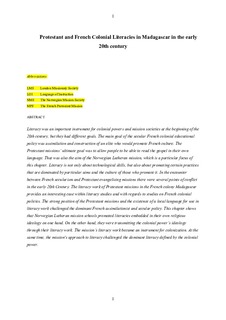| dc.contributor.author | Rosnes, Ellen Vea | |
| dc.coverage.spatial | Madagascar | nb_NO |
| dc.date.accessioned | 2019-03-05T15:41:54Z | |
| dc.date.available | 2019-03-05T15:41:54Z | |
| dc.date.created | 2016-10-11T11:53:30Z | |
| dc.date.issued | 2016 | |
| dc.identifier.citation | Rosnes, E.V. (2016) Protestant and French Colonial Literacies in Madagascar in the early 20th century. In Kallaway, P. & Swartz, R. (Eds.) Empire and Education in Africa : The Shaping of a Comparative Perspective, pp. 271-297, Peter Lang. | nb_NO |
| dc.identifier.isbn | 9781433135811 | |
| dc.identifier.uri | http://hdl.handle.net/11250/2588886 | |
| dc.description | This version is made available in accordance with publisher policies. It is an Accepted Manuscript that has been published In Kallaway, P. & Swartz, R. (Eds.) Empire and Education in Africa : The Shaping of a Comparative Perspective, pp. 271-297, in the series "History of Schools and Schooling". Please cite only the published version using the reference above. | nb_NO |
| dc.description.abstract | Literacy was an important instrument for colonial powers and mission societies at the beginning of the 20th century, but they had different goals. The main goal of the secular French colonial educational policy was assimilation and construction of an elite who would promote French culture. The Protestant missions’ ultimate goal was to allow people to be able to read the gospel in their own language. That was also the aim of the Norwegian Lutheran mission, which is a particular focus of this chapter. Literacy is not only about technological skills, but also about promoting certain practices that are dominated by particular aims and the culture of those who promote it. In the encounter between French secularism and Protestant evangelising missions there were several points of conflict in the early 20th Century. The literacy work of Protestant missions in the French colony Madagascar provides an interesting case within literacy studies and with regards to studies on French colonial policies. The strong position of the Protestant missions and the existence of a local language for use in literacy work challenged the dominant French assimilationist and secular policy. This chapter shows that Norwegian Lutheran mission schools promoted literacies embedded in their own religious ideology on one hand. On the other hand, they were transmitting the colonial power’s ideology through their literacy work. The mission’s literacy work became an instrument for colonization. At the same time, the mission's approach to literacy challenged the dominant literacy defined by the colonial power. | nb_NO |
| dc.language.iso | eng | nb_NO |
| dc.publisher | Peter Lang AG | nb_NO |
| dc.relation.ispartof | Empire and Education in Africa. The Shaping of a Comparative Perspective | |
| dc.relation.ispartofseries | History of Schools and Schooling; | |
| dc.subject | utdanningsvitenskap | nb_NO |
| dc.subject | literacy | nb_NO |
| dc.subject | Afrika | nb_NO |
| dc.subject | misjonshistorie | nb_NO |
| dc.subject | Madagaskar | nb_NO |
| dc.subject | lesevitenskap | nb_NO |
| dc.subject | kolonihistorie | nb_NO |
| dc.title | Protestant and French Colonial Literacies in Madagascar in the Early Twentieth Century | nb_NO |
| dc.type | Chapter | nb_NO |
| dc.description.version | acceptedVersion | nb_NO |
| dc.rights.holder | © Peter Lang AG 2016 | nb_NO |
| dc.subject.nsi | VDP::Social science: 200::Education: 280 | nb_NO |
| dc.subject.nsi | VDP::Humanities: 000::History: 070 | nb_NO |
| dc.source.pagenumber | 271-298 | nb_NO |
| dc.identifier.doi | 10.3726/978-1-4539-1839-5 | |
| dc.identifier.cristin | 1390897 | |
| cristin.unitcode | 217,6,2,0 | |
| cristin.unitname | Institutt for kultur- og språkvitenskap | |
| cristin.ispublished | true | |
| cristin.fulltext | original | |
| cristin.fulltext | postprint | |
| cristin.qualitycode | 1 | |

